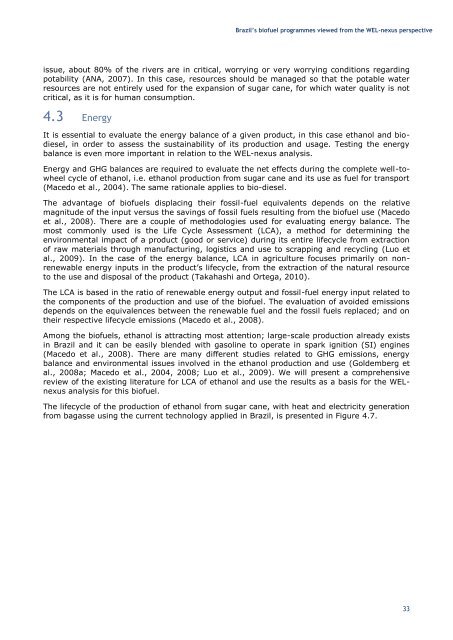Brazilian Biofuels Programmes from the WEL Nexus Perspective
Brazilian Biofuels Programmes from the WEL Nexus Perspective
Brazilian Biofuels Programmes from the WEL Nexus Perspective
- No tags were found...
Create successful ePaper yourself
Turn your PDF publications into a flip-book with our unique Google optimized e-Paper software.
Brazil’s biofuel programmes viewed <strong>from</strong> <strong>the</strong> <strong>WEL</strong>-nexus perspectiveissue, about 80% of <strong>the</strong> rivers are in critical, worrying or very worrying conditions regardingpotability (ANA, 2007). In this case, resources should be managed so that <strong>the</strong> potable waterresources are not entirely used for <strong>the</strong> expansion of sugar cane, for which water quality is notcritical, as it is for human consumption.4.3 EnergyIt is essential to evaluate <strong>the</strong> energy balance of a given product, in this case ethanol and biodiesel,in order to assess <strong>the</strong> sustainability of its production and usage. Testing <strong>the</strong> energybalance is even more important in relation to <strong>the</strong> <strong>WEL</strong>-nexus analysis.Energy and GHG balances are required to evaluate <strong>the</strong> net effects during <strong>the</strong> complete well-towheelcycle of ethanol, i.e. ethanol production <strong>from</strong> sugar cane and its use as fuel for transport(Macedo et al., 2004). The same rationale applies to bio-diesel.The advantage of biofuels displacing <strong>the</strong>ir fossil-fuel equivalents depends on <strong>the</strong> relativemagnitude of <strong>the</strong> input versus <strong>the</strong> savings of fossil fuels resulting <strong>from</strong> <strong>the</strong> biofuel use (Macedoet al., 2008). There are a couple of methodologies used for evaluating energy balance. Themost commonly used is <strong>the</strong> Life Cycle Assessment (LCA), a method for determining <strong>the</strong>environmental impact of a product (good or service) during its entire lifecycle <strong>from</strong> extractionof raw materials through manufacturing, logistics and use to scrapping and recycling (Luo etal., 2009). In <strong>the</strong> case of <strong>the</strong> energy balance, LCA in agriculture focuses primarily on nonrenewableenergy inputs in <strong>the</strong> product’s lifecycle, <strong>from</strong> <strong>the</strong> extraction of <strong>the</strong> natural resourceto <strong>the</strong> use and disposal of <strong>the</strong> product (Takahashi and Ortega, 2010).The LCA is based in <strong>the</strong> ratio of renewable energy output and fossil-fuel energy input related to<strong>the</strong> components of <strong>the</strong> production and use of <strong>the</strong> biofuel. The evaluation of avoided emissionsdepends on <strong>the</strong> equivalences between <strong>the</strong> renewable fuel and <strong>the</strong> fossil fuels replaced; and on<strong>the</strong>ir respective lifecycle emissions (Macedo et al., 2008).Among <strong>the</strong> biofuels, ethanol is attracting most attention; large-scale production already existsin Brazil and it can be easily blended with gasoline to operate in spark ignition (SI) engines(Macedo et al., 2008). There are many different studies related to GHG emissions, energybalance and environmental issues involved in <strong>the</strong> ethanol production and use (Goldemberg etal., 2008a; Macedo et al., 2004, 2008; Luo et al., 2009). We will present a comprehensivereview of <strong>the</strong> existing literature for LCA of ethanol and use <strong>the</strong> results as a basis for <strong>the</strong> <strong>WEL</strong>nexusanalysis for this biofuel.The lifecycle of <strong>the</strong> production of ethanol <strong>from</strong> sugar cane, with heat and electricity generation<strong>from</strong> bagasse using <strong>the</strong> current technology applied in Brazil, is presented in Figure 4.7.33
















